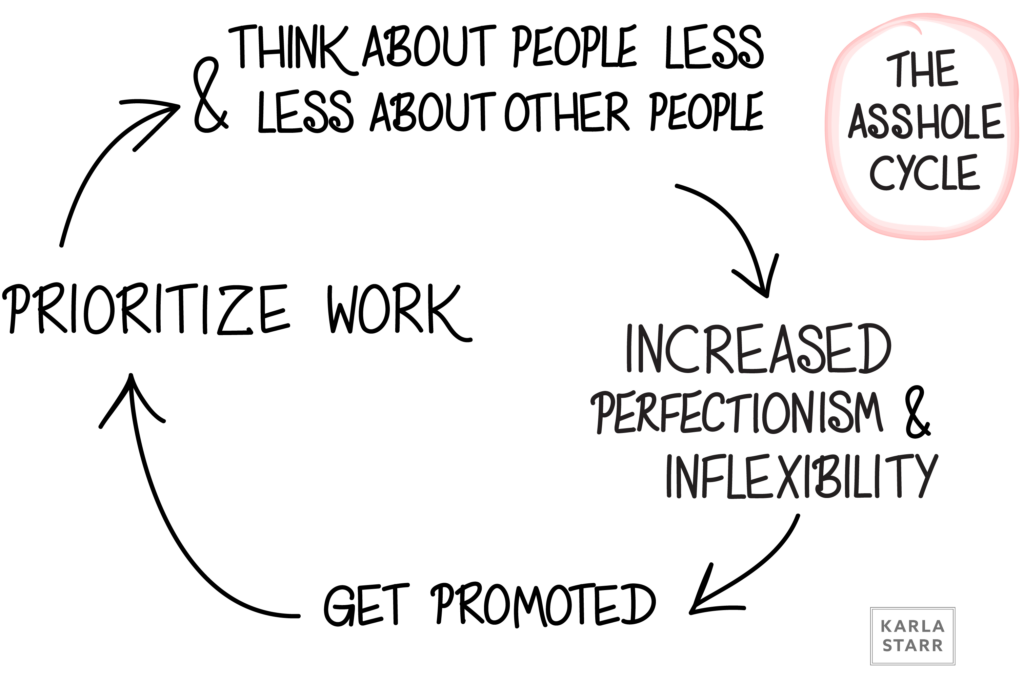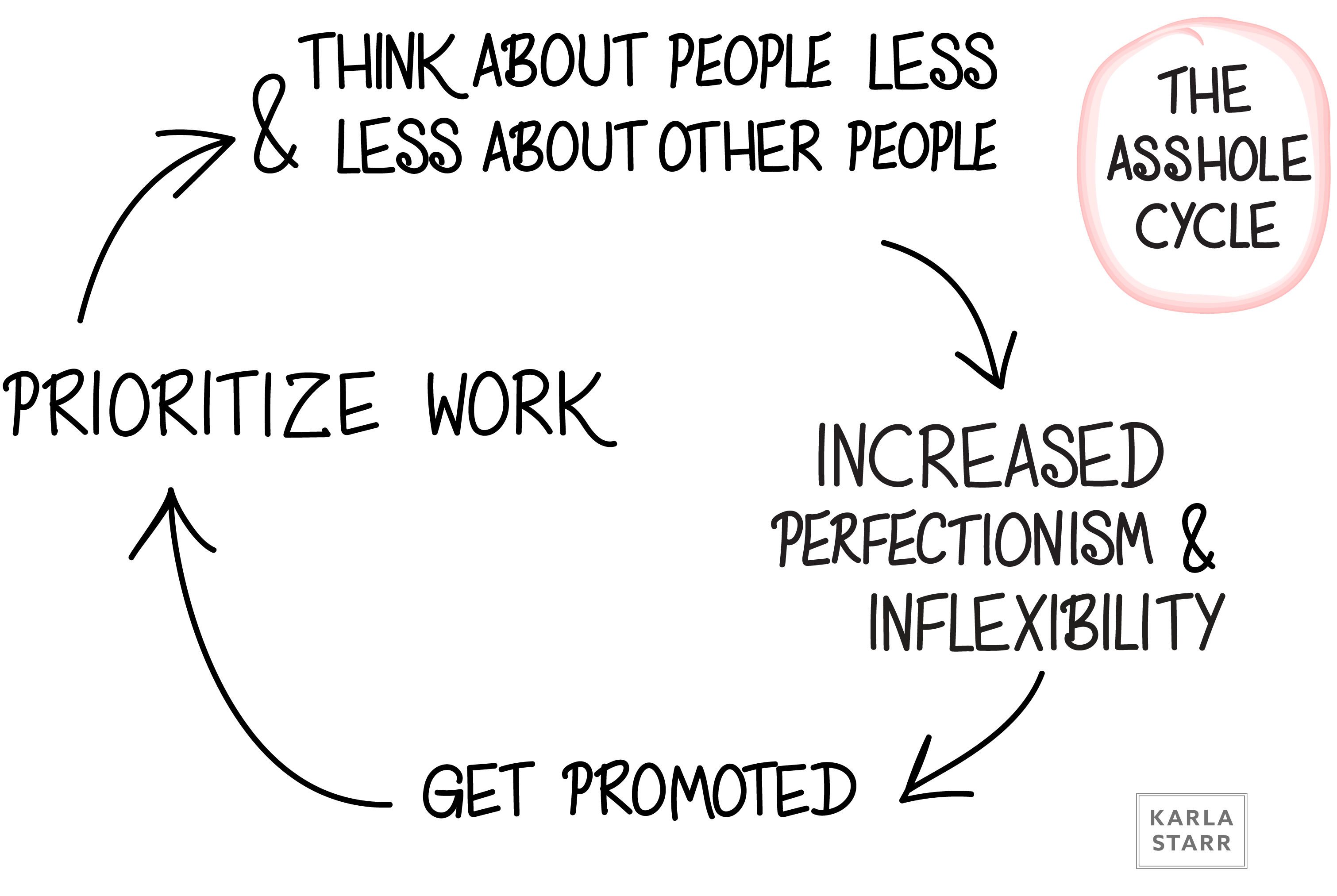Table of Contents
Those qualities of which we are most proud can prove our undoing
How Becoming a Boss Can Turn You Into an Asshole
No, Employees Aren’t a Good Proxy for “The Rest of the World”
Those qualities of which we are most proud can prove our undoing
Here’s part of the chapter “Our Greatest Strengths Are Our Greatest Weaknesses” by Gordon Livingston in the criminally under-read Too Late Smart, Too Soon Old:
There are certain personality characteristics that are highly correlated with academic and professional success: dedication to work, attention to detail, ability to manage time, conscientiousness. People who have this constellation of traits are generally excellent students and productive workers. They can also be difficult to live with.
In a work situation, this is usually an adaptive approach… it is often puzzling to such people that approaches that make them successful in their work are so poorly received by those they live with. Practically any human characteristic — competitiveness, orderliness, even kindness — when indulged to an extreme can produce undesirable results. We need to acknowledge that those qualities of which we are most proud can prove our undoing.”
Fact: the most outwardly successful people I’ve known are also the least well-liked — even unlikeable — people I’ve ever known. It’s actually pretty easy to have a fancy-sounding title while remaining completely ignorant of being a widely disliked person. Let’s call them USP: Unliked Successful People.
Here’s a brief overview, according to social psychology, of How Managers Become Assholes Without Realizing It:
Narcissists are initially quite charming at first.1Back, Mitja D., Stefan C. Schmukle, and Boris Egloff. “Why are narcissists so charming at first sight? Decoding the narcissism–popularity link at zero acquaintance.” Journal of Personality and Social Psychology 98, no. 1 (2010): 132-145. Link. Perhaps they get away with the occasional lapse into dick-ish behavior because they’re shielded and/or emboldened by a form of pre-existing status. Using appearance, money, intelligence, or connections as a passive aggressive weapon can start when you’re young:2Lara Mayeux, John J. Houser, and Karmon D. Dyches. “Social Acceptance and Popularity: Two Distinct Forms of Peer Status,” in Popularity in the Peer System, edited by Antonius H. N. Cillessen, David Schwartz, and Lara Mayeux. (New York, NY: The Guilford Press, 2011): 87.
“For young people who are lucky enough to have wealthy parents or good looks, the schoolyard is an easy place to get by: Not only do peers want to befriend them and ascribe them significant social power, but they also are willing to overlook and even reward their sometimes nasty behavior. For children who do not have such luck, the road is much more difficult.”
Of course, we’re not all capable of perfect empathy with everyone all the time. But there’s usually a tiny difference that sets USPs apart in the beginning: Prioritizing accomplishments over relationships.
How Becoming a Boss Can Turn You Into an Asshole
Our environment consists of other people — we can survive anywhere, as long as we’re with humans. Humans are action-oriented prediction machines, and seeing the world according to our goals and capabilities minimizes the energy we need to complete a task.3Andy Clark. “Whatever next? Predictive brains, situated agents, and the future of cognitive science.” Behavioral and brain sciences 36, no. 3 (2013): 181-204. Link. Having a sense of personal power or status actually changes our perception of the world. When people are made to feel like the boss, they actually feel a greater psychological distance from others, which changes how they process information.4Joe C. Magee and Pamela K. Smith. “The social distance theory of power.” Personality and social psychology review 17, no. 2 (2013): 158-186. Link.
Just feeling like you have power can boost your performance. People on top, driven in part by perceived power or status, have greater activity in what’s known as the Behavioral Activation System.
When you’re on the top, you’re more sensitive to rewards,” says researcher Jacob Hirsh. You become less concerned with punishments, making errors, and perceived threats in the environment— because, quite simply, because your future is less affected by them. This decrease in anxiety and increase in confidence causes a boost in performance.5Pamela K. Smith et al. “Lacking Power Impairs Executive Functions.” Psychological science 19, no. 5 (2008): 441-447. Link.
Fact: the brain can only process so much information at once. And it’s lazy.
Mentalizing is the ability to think about what other people are thinking, a concept known as theory of mind. Humans can also go deeper — second-order theory of mind, thinking about what other people think about us. It’s the essence of morality.6Gray, Kurt, Liane Young, and Adam Waytz. “Mind perception is the essence of morality.” Psychological inquiry 23, no. 2 (2012): 101-124. Empathizing with others makes us human, and makes us better to get along with —it’s also a kind of cognitive effort that many people avoid, especially when they believe that it’s hard work and not worth the effort.7C. Daryl Cameron et al. “Empathy is hard work: People choose to avoid empathy because of its cognitive costs.” Journal of Experimental Psychology: General 148, no. 6 (2019): 962-976. Link.
Quite simply, if your boss doesn’t feel like they have to take other people’s mental states into consideration, they won’t. Experience changes the brain, and feeling like they’re high on the totem pole means that they don’t rely on others as much. Not only do they not care what others think, they’re think less of them. We see lower status individuals as lacking in the very cognitive skills (executive functions like self-discipline, intelligence, and emotional regulation) and emotions (regret, hope) associated with being human.8Lammers, Joris, and Diederik A. Stapel. “Power Increases Dehumanization.” Group Processes & Intergroup Relations 14, no. 1 (2011): 113-126. Link.

No, Employees Aren’t a Good Proxy for “The Rest of the World”
Workaholics in managerial positions spend the vast majority of their time in their role as the “boss.” The “boss” does not have a workday like employees: they communicate with workers whose jobs require them to put on a good face. Lawyers, agents, employees, handlers, and assistants put up with awful behavior because they are getting paid to do so — their very livelihoods depend on it.
Because your Asshole Boss is Typically a workaholic and spends most of their time at work, they forget that 95% of their interactions are with people who are getting paid to tolerate them. From their perspective, they’re surrounded by people who think their jokes are hilarious, their ideas are sound, and their hat doesn’t look like they’re trying too hard.
Fun fact — I’ve lost track of how many of these kinds of guys I’ve dated:
Him: [Tells horrible joke.]
Me: Oh, I see…
Him: That was funny! It killed today at work.
Me: Really?
Him: You’re the only person who didn’t laugh at that joke.
Me: When did you tell it?
Him: At a meeting.
Me: You mean a meeting? Of your company? When you were surrounded by people whose ability to feed their families requires them to be on your good side?
When a USP goes home, they may be either dealing with no one; think of a high status/single person situation, a la Harvey Spector in Suits. A USP might say “I work all the time — I can’t have a relationship or any meaningful friendship!” without realizing that their personality, rather than lack of time, is causing that vacuum.
Feedback, not practice, makes us improve. Without listening to people’s feedback about how you’re treating others, there’s no chance to improve. As Gordon Livingston wrote in Too Late Smart, Too Soon Old: But we need to acknowledge that those qualities of which we are most proud can prove our undoing.
When Money = Time
When I’m typing, I’m not really thinking about other people, either. But the longer I’m in “work” mode, the longer my brain takes to shift back to the normal “I gotta take out the trash, walk the dog, and enjoy life” mode. Instead, I start thinking someone else should do this shit.
The more we think about our time in terms of money, the more impatient we become. The harder it becomes to make time to take care of basic life tasks — we see them as stressors to be finished yesterday — and taking time to slow down, savor, and find joy becomes impossible.
As Oliver Burkeman notes in the excellent Four Thousand Weeks: Time Management for Mortals, people in billable-hour style professions, like the law, have an extraordinarily hard time getting out of this mindset. That’s why lawyers are more likely to miss their kid’s soccer game, justifying that shivering on the sidelines isn’t worth $500 in missed income.
The most important things in life aren’t quantifiable: how do you feel about your life? Are you fulfilled? Does your family know you love them? Do you feel like you can trust your colleagues — have a friend at work? Did you enjoy and savor that book, or just speed-read it to check it off of a list, thereby denying yourself a great deal of pleasure?
Remember: the tell-tale sign of a USP or an asshole coworker/boss is that their prioritize accomplishments over relationships. Over time, they’re rewarded for speed, precision, and perfection—and fail to see the downsides of a loss of cognitive flexibility and an inability to change gears. They might not realize that, from their family’s perspective, their relationships are thin and strained. They only see a few missed soccer games — but to their kids, that’s their world, and the proudest moment of their lives. Soon it’ll be a lifetime of fodder for their children’s therapy sessions. Because of their indifference to those around them, they may not even realize how unhappy their spouse is.
I put strict limits on how much time I spend working, thanks to how much time I’ve spent with long-time workaholics. Experience changes the brain, and spending so much time working makes it difficult to disengage from that mindset, much to the detriment of everything else. I know workaholics who enjoy spending time on the road because they “get better service at a hotel than at home,” mistaking their family’s contributions to household cleanliness as a service purchased by their earnings.
I’ve worked with people who scoffed when I wanted to spend 30 minutes at the gym — focused on the time they thought they were losing, rather than the health, energy, and life I was gaining. I gained the most, of course, when we stopped working together.
